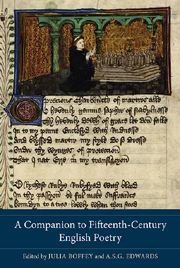Book contents
- Frontmatter
- Contents
- List of Contributors
- List of Abbreviations
- Conventions
- Introduction
- Part I Background and Context
- Part II Authors
- Part III Themes and Genres
- 11 Fifteenth-Century Chaucerian Visions
- 12 Historical and Political Verse
- 13 Classical and Humanist Translations
- 14 Romance
- 15 Scientific and Encyclopaedic Verse
- 16 Popular Verse Tales
- 17 Beyond the Fifteenth Century
- Chronology
- Index of Manuscripts
- General Index
14 - Romance
from Part III - Themes and Genres
Published online by Cambridge University Press: 05 July 2013
- Frontmatter
- Contents
- List of Contributors
- List of Abbreviations
- Conventions
- Introduction
- Part I Background and Context
- Part II Authors
- Part III Themes and Genres
- 11 Fifteenth-Century Chaucerian Visions
- 12 Historical and Political Verse
- 13 Classical and Humanist Translations
- 14 Romance
- 15 Scientific and Encyclopaedic Verse
- 16 Popular Verse Tales
- 17 Beyond the Fifteenth Century
- Chronology
- Index of Manuscripts
- General Index
Summary
Romance, as a literary mode, is frequently characterised by its resistance to narrative closure – a resistance fuelled, as in any Charles Dickens novel, by multiple and multiplying incidents and characters, frequently spanning generations as well as continents (Parker 1974: 1 and passim). That picture of generation, movement and the crossing of new boundaries fits well with the history of verse romance texts themselves in fifteenth-century England. As more and more romance texts are sent forth, like young aspirant adventurers, by their makers or foster-parents – ‘Go, litel bok, go’ (TC, V.1786) – and as older textual ‘warriors’ continue to find new armour in which to fight their battles, romance texts seem to venture forth with the inexhaustible strength and generative capabilities of the romance heroes themselves. Romance, in the hands of fifteenth-century readers, authors and redactors, is as prolific and procreative as the worlds that it depicts.
If previous accounts of fifteenth-century verse romance have tended to denigrate its achievements in comparison to Ricardian literature (Wallace 1999: xii), then a corrective defence needs to be mounted first of all in relation to the multitude, variety and later influence of verse romance writing in the fifteenth century. The focus of this chapter must be on romance in verse, though the strong development of prose romance in the latter part of the century is not a self-contained act: the success of Caxton's romances inevitably owed something to the century's insatiable appetite for romance narratives of all kinds.
- Type
- Chapter
- Information
- A Companion to Fifteenth-Century English Poetry , pp. 187 - 198Publisher: Boydell & BrewerPrint publication year: 2013



